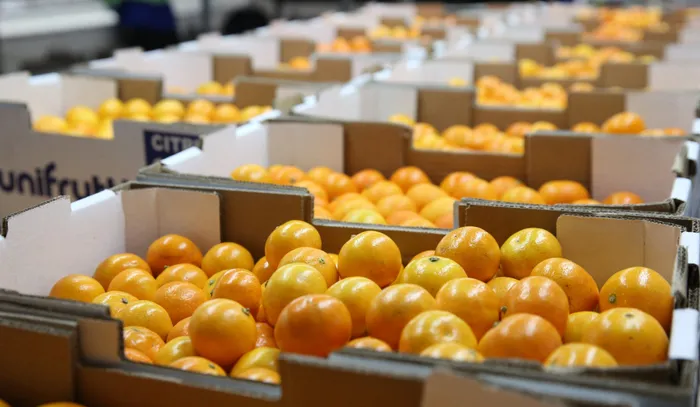
The Agricultural Business Chamber of South Africa (Agbiz) said that South Africa's agricultural exports have remained strong in the first three quarters of the year despite significant trade policy shifts and uncertainty.
Image: Zanele Zulu | Independent Newspapers
South Africa’s agricultural sector continued its strong export performance in 2025, defying global trade uncertainty and shifting policy environments, according to the Agricultural Business Chamber of South Africa (Agbiz).
The country’s agricultural exports reached $11.7 billion (R189 billion) in the first three quarters of the year — a 10% increase compared to the same period in 2024.
Agbiz chief economist Wandile Sihlobo said third-quarter exports alone totalled $4.7bn (R68bn), up 13% year-on-year, driven by higher export volumes and firm commodity prices.
South Africa’s export mix remained diverse, led by citrus, nuts, apples, pears, maize, wine, sugar, fruit juices, berries, grapes, pineapples, avocados and soybeans. Improved port performance — despite ongoing challenges — also helped sustain the flow of agricultural goods out of the country.
Sihlobo noted that operational improvements at key ports were noticeable over recent months, coinciding with ongoing reforms across South Africa’s network industries.
“Although there remains a need for further improvement in port efficiency, we have witnessed a notable improvement compared to recent months,” Sihlobo said.
“We observed a similar experience in the past two quarters. This has supported export activity and illustrates the gains from the ongoing policy reforms in the South African network industries.”
The African continent remained South Africa’s largest agricultural export destination, accounting for 34% of exports in the third quarter. Top products included maize and maize meal, apples and pears, wheat, fruit juices, wine, nuts, sugar, vegetable oils and live animals.
Asia and the Middle East collectively formed the second-largest market, taking 25% of South Africa’s agricultural exports. Citrus, nuts, apples, pears, wool, sugar, berries, grapes, beef, mutton, maize and stone fruit were among the leading products destined for the region.
The European Union was the third-largest destination with a 23% share, mainly importing citrus, wine, grapes, nuts, fruit juices, tropical fruit, apples, pears, berries and sugar.
Exports to the Americas accounted for 6% of total agricultural exports in the third quarter. However, shipments to the United States declined after a temporary pause of planned higher tariffs expired.
South Africa’s agricultural exports to the US fell 11% year-on-year in the third quarter to $144 million (R2.4bn). The product mix remained largely unchanged, comprising citrus, wine, fruit juices and nuts.
Sihlobo said front-loading of exports during the 90-day tariff pause in the second quarter partly explained the subsequent slowdown.
FNB’s head of agriculture information and marketing, Dawie Maree, agreed that the sector’s performance was boosted by a strong citrus harvest, smooth port operations and robust demand, particularly in markets experiencing lower-than-expected Northern Hemisphere output.
“We had a good citrus crop and they've achieved record exports. There were no material problems/backlogs at our exporting ports, which meant that exports could continue without problems,” Maree said.
“There were some front-loading of exports to the US while the Liberation Day Tariffs were on hold and that also contributed to the increase in the exports. Lower than expected crops in the Northern hemisphere resulted in higher demand for products, which is beneficial to our exporters.”
TLU SA general manager, Bennie van Zyl, urged South Africans to consider the broader context of export flows, saying the US is an important but relatively small destination for local citrus.
“A lot of our thinking at this stage is influenced by the whole interaction with the United States and the tariffs from their side. If you get some context, we export approximately over 200 million cases of citrus per year, of which about last year, last season, was about 6 million to the United States,” he said.
“Our approach from TLU South Africa is that we should keep every market intact because there's lines through which the farmers export.”
BUSINESS REPORT